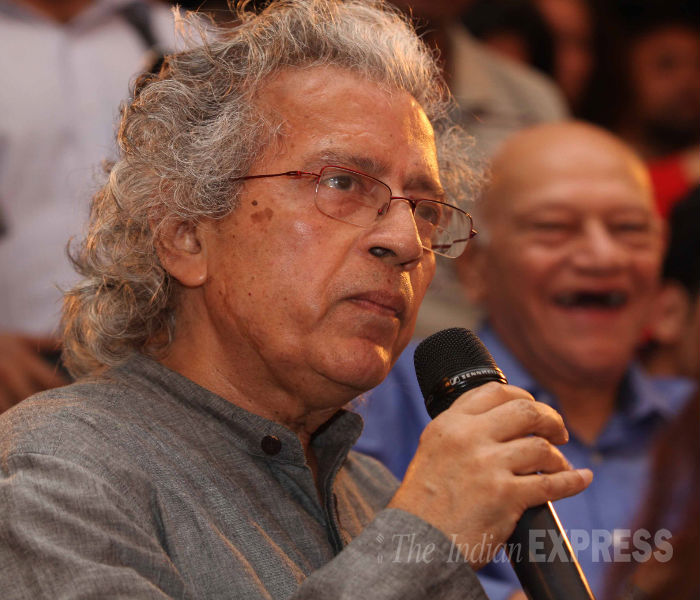 ONE OF India’s best-known editors and a tireless supporter of the arts, Anil Dharker died on Friday morning following a bypass surgery in Mumbai (Source: Express Photo by Vasant Prabhu)
ONE OF India’s best-known editors and a tireless supporter of the arts, Anil Dharker died on Friday morning following a bypass surgery in Mumbai (Source: Express Photo by Vasant Prabhu) ONE OF India’s best-known editors and a tireless supporter of the arts, Anil Dharker died on Friday morning following a bypass surgery in Mumbai. He was 74.
During his lifetime, Dharker donned many hats and was the lifeline of the popular literary festival, Tata Literature Live! He also worked as an editor across several publications from different genres, starting with Debonair, then Mid-day, The Independent, and The Illustrated Weekly of India.
Media producer and former Rajya Sabha member Pritish Nandy, who was associated with Dharker since his journalism years, said, “Anil reinforced the role of the editors in our time.”
Journalist Jyoti Punwani, who worked with Dharker at The Independent in the early 1990s, recalled that he was “a kind editor” whose edit meetings were very enjoyable, with a whole range of topics up for discussion, indicative of his versatility. “Editors can be encouraging. But kind, they are not. Anil was different that way. And, he never censored our ideas,” she said.
Dharker was born in Mumbai on August 15, 1946. With a father who worked in the railways, he grew up in Mumbai, Gorakhpur and Vadodara. He earned dual degrees in mathematics and mechanical engineering from the University of London, following which his first stint in India was in architecture, looking at fire safety in multi-storeyed buildings.
His interest in cinema, and his writings on it, led him to the National Film Development Corporation (NFDC), then called the Film Finance Corporation. Eventually, he headed the NFDC, helping several young filmmakers launch their first oeuvres and enabling NFDC to co-produce Richard Attenborough’s seminal film, Gandhi.
“He was a multifaceted person with interests that ranged from cinema to single malts and tennis,” said author Jerry Pinto. There are two visions of Dharker that he remembers — one as the dapper man who wore a kurta and churidar with great style, and the other in shorts and T-shirt, sweating after a match at the Bombay Gymkhana.
“He was a liberal and had a fierce courage as a writer and as an editor. And so, when parochialism reared its ugly head, you could rely on him to speak as a cosmopolitan voice,” Pinto said.
In recent years, Dharker was best known for his sustained interest in India’s literary culture. He was the founder and director of Tata Literature Live!, an annual literature festival that has a prominent place in Mumbai’s cultural calendar. Nandy said that this was Dharker’s idea in “an age when books are no longer centerstage, to build excitement over new book releases”.
During the course of the festival, held mainly at the National Centre for Performing Arts (NCPA) at Nariman Point, Dharker was a familiar face at panel discussions and cafes, donning his signature kurta-churidar. A regular attendee of the festival, Viji Venkatesh, the South Asia region head of a cancer foundation, recalled Dharker fondly on social media. Some years ago, she and some cancer patients had gone to the festival for a talk by Siddhartha Mukherjee, author of The Emperor of All Maladies, only to find that it was sold out. Dejected, they decided to grab a bite at the cafe before heading back home. That’s when Dharker, Venkatesh’s longtime friend, approached them and, upon noting that there were cancer patients with, made sure that everyone got front-row seats for the talk and a chance to interact with Mukherjee.
Upon his passing, Tata Literature Live! noted in a statement, “Anil Dharker was the quintessential Renaissance Man…an engineer by training who shone in the Arts. He married his scientific temper to a keen love for literature, cinema, music and art, straddling both Indian and Western traditions.”
Dharker was also an avid sports fan, particularly of cricket and tennis. Veteran sports journalist Ayaz Memon, who worked with him at Mid-day and The Independent, said Dharker followed cricket very closely, exchanging notes about the recent Australia series on a daily basis.
“I think he liked the relaxed pace of Test cricket as it threw up more discussion points,” Memon said.
This interest in sports also meant that Dharker brought in quality panel discussions and authors who specialised in sports writing at Tata Literature Live! Memon said Dharker had at one point planned on having a separate festival dedicated to sports writing.
Dharker’s engagement with India’s arts, culture and sports was underscored by a deep interest in protecting the country’s secular spirit. He was a founder-member of Citizens for Justice and Peace (CJP), a human rights movement, and was its third and most recent president.
Civil rights activist Teesta Setalvad, CJP’s secretary, described Dharker as being “unfailingly committed to India’s secular, pluralistic democracy”. She said, “His core commitment was to these values, and that shone through every role, whether in a literature festival or in journalism.”
full report on
http://www.indianexpress.com
- The Indian Express website has been rated GREEN for its credibility and trustworthiness by Newsguard, a global service that rates news sources for their journalistic standards.

